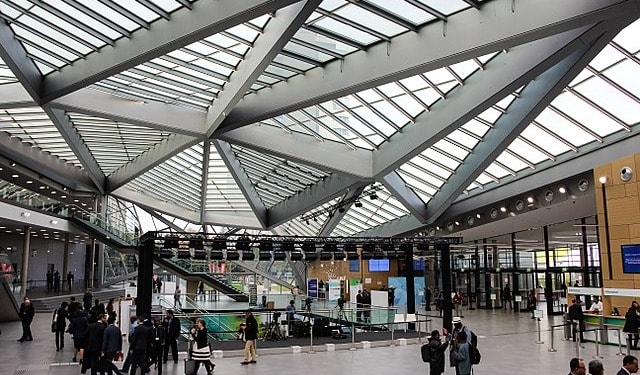Coming to a close Friday, the June 2022 Bonn Climate Conference ended on a bittersweet note with many solutions put on the table, but disagreement still circling the air.
The 56th Bonn Climate Conference was held from June 6 to 16 at the World Convention Center in Bonn, Germany, with over 4,000 delegates from 200 countries in attendance. Talks were in preparation for the United Nations Climate Conference which will take place in Sharm el-Sheikh, Egypt in November.
After two weeks of hefty talks involving climate problems, progress and solutions, the conference ended in disagreements as developing countries claim rich countries are working at a slow pace to invoke “loss and damages” for climate change-related catastrophes that have been accelerated from rich countries carbon emissions.
Nations talk progress
One of the first things the climate conference addressed is whether countries have continued to live up to their climate pledges made at the UN Climate Summit in Glasgow last year.
Some of the biggest pledges made in Glasgow included promises from Australia, China, the United States and the European Union to cut carbon emissions.
In late May, Australia voted out conservative Prime Minister Scott Morrison in what is often described as a “climate election” — a fight for climate rights. Successfully, Prime Minister Anthony Albanese filled the position and has already backed a target, pledging to cut down greenhouse gas emissions 43% by 2023.
The United States and China made a joint pledge in Glasgow to partner on boosting clean energy as well as curb emissions of methane. Yet as Beijing seeks to boost economic growth after the pandemic, China could actually increase its fossil fuel intake.
Progress on the US side also appears to be waning as Biden struggles to fulfill his climate goals of 100% clean energy by 2035 after a scandal in the solar industry placed half of the nation’s solar projects to a halt.
Recently, the European Union has also promised ambitious climate targets under the REPowerEU Plan, which is set to help phase out dependence on Russian energy, increase energy efficiency in Europe and boost the transition to renewable energy. The bloc, however, has faced a load of backlash as member states continue to disagree on phasing on Russian imports and/or seek to find fossil fuel gas elsewhere instead of turning to renewable sources.
🔊 NOW: Activists protest outside the climate conference in #Bonn against buying fossil fuels from autocrats & fuelling the war in Ukraine ✊🔥
We call for an immediate end to financing fossil fuels from 🇷🇺. No more war, no more fossil fuel expansion! pic.twitter.com/4BPsX7858f
— Dominika Lasota (@DominikaLasota1) June 10, 2022
IPCC reports startling findings
The International Panel on Climate Change revealed a striking climate report last week as the Bonn Conference kicked off.
The report highlighted several key points from experts:
- Multiple climate hazards are occurring simultaneously;
- impacts are increasingly challenging to manage;
- maladaptation specifically affects low-income households;
- forms of maladaptation can increase greenhouse gas emissions and strong intersections between climate change and biodiversity loss.
In his opening remarks on the report, SBSTA (Subsidiary Body for Scientific and Technological Advice) Chair Tosi Mpanu Mpanu remarked that climate change affects people’s lives, nature and infrastructure and that the report reflects urgent and strengthened climate action be taken.
Ibidun Adelekan, researcher and professor at University of Ibadan in Ibadan, Nigeria, backed up the reports urgency when mentioning that “The Working Group 11 report of the IPCC shows that the impact of climate change is worsened by destruction of habitats, also unsustainable use of natural resources, deforestation, growing urbanization and population growth trends.”
IPCC Chair Hoesung Lee also relayed the ongoing concern of rising surface temperatures, saying even temporarily exceeding 1.5 degrees Celsius — the limit for planet temperatures rise agreed upon in 2015 as part of the Paris Agreement — will have costly and potentially irreversible impacts.
Nuclear Energy possible energy solution
The International Atomic Energy Agency (IAEA) gave a solid pitch for nuclear energy as a safer and cleaner energy solution at the Bonn Conference.
Building on its presence at the previous UN Summit in Glasgow, the IAEA held a side event in connection with UNFCCC Session of the Subsidiary Body for Scientific and Technological Advice on June 13.
The hybrid event talked about the future implications nuclear energy could have on the energy industry as countries vie for alternatives to natural gas.
According to the IAEA’s Nuclear Energy for a Net Zero World, with 24/7 electricity generation reliability, robust design and fuel supplies stored on site for long periods of time, nuclear power plants can help make energy systems more resilient to the climate impacts expected in the future.
In recent years, nuclear power has shown a strong resilience in the face of extreme weather events that typically interrupt conventional electricity generator facilities.
Although the appeal is certainly there for nuclear power, it has had its problems in the past such as nuclear leaks that have led to catastrophic impacts on the environment.
Maxx Dilley, Director of the Climate Programme at the World Meteorological Organization, addressed these issues at the conference, saying:
”We need to build in the resilience within the system, so the impact is not as catastrophic and the recovery time is reduced as much as possible.”
Despite proposed solutions, the Conference ended in disagreement
One of the key goals developing countries had in Bonn was ensuring “loss and damage” compensation makes the COP27 agenda.
The “loss and damage” is the idea that developing countries should receive financial compensations from richer countries because they have contributed disproportionately to climate change and its negative impacts as a result of historically generating significantly higher carbon emissions.
At last year’s climate conference in Glasgow, island states and developing countries agreed to prioritize cutting carbon emissions with the promise from richer nations that they would set up a “loss and damage” funding facility this year.
Yet despite two weeks of discussions in Bonn, they have been unable to get the funding on the agenda for November’s UN COP Summit in Sharm El-Sheikh, Egypt.
“The compromise was based on an understanding that countries would be willing to start talking and taking decisions on dealing with how to get that finance flowing for loss and damage,” Alex Scott from E3G, an environmental think tank said. “And we haven’t seen that come to fruition here. Instead, we’ve seen a workshop set up to talk about how we can fix some of the problems.”
Powerful closing action at #BonnClimateConference #SB56 with civil society calling out for rich countries ACT NOW on the #ClimateCrisis:to stop blocking #LossAndDamage; pay up #climatefinance and for #realsolutions not #falsesolutions pic.twitter.com/E9DVFoisEo
— Sara Shaw (@Climatemouse) June 16, 2022
The US and EU don’t agree with the compensation damage funding, fearing that if they pay for historic emissions, they would have to pay billions of dollars for decades to come.
The EU in particular has come under scrutiny for their actions in this field.
“The EU consistently blocked discussions on finance for loss and damage in Bonn,” Harjeet Singh, from the Climate Action Network International, said. “The last two weeks exposed its hypocritical stance, with major countries like Germany sourcing new fossil fuels abroad while denying support to developing countries facing devastation from climate-induced superstorms and rising seas.”
Despite some progress on talks that will hopefully continue at the UN next Summit, it appears some quintessential items will not appear on the agenda, which could lead to further tension between nations down the line.
Editor’s Note: The opinions expressed here by Impakter.com columnists are their own, not those of Impakter.com. — In the Featured Photo: 2017 Bonn Climate Conference in Bonn, Germany. Source: Axel Kirch, Wikimedia.








